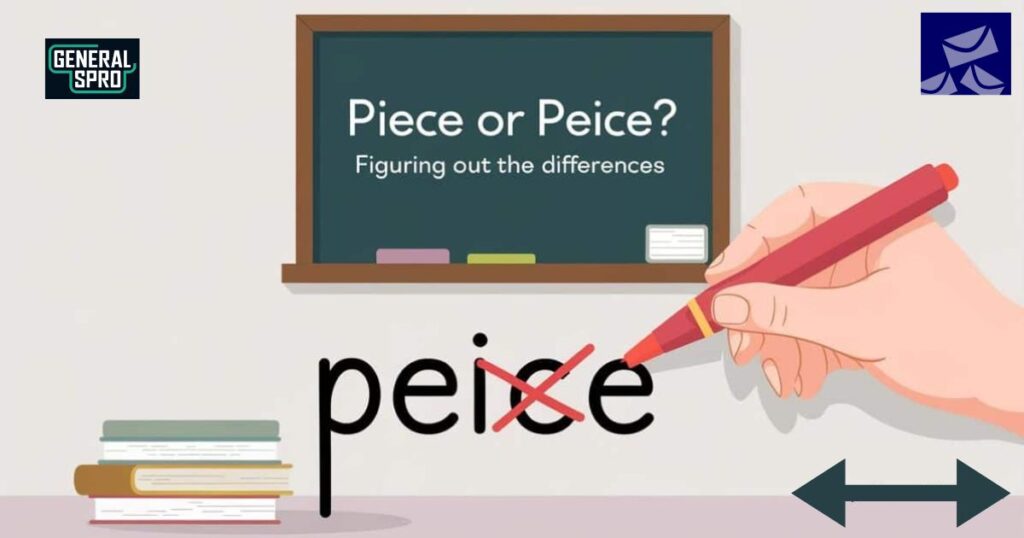Writing confidently means knowing the ins and outs of tricky English spellings. Among these, the word “piece” frequently trips up writers of all skill levels.
This comprehensive guide will help you master the correct spelling and understand why “piece” isn’t the right choice. Let’s dive into the nuances of this commonly confused word and equip you with practical strategies to remember its proper spelling.
Understanding the Correct Spelling: Piece
The word “peace” comes from the Old French word “peace” and the Medieval Latin “special,” meaning a portion or fragment. Modern English has maintained this spelling while expanding its meaning to encompass various contexts.
Understanding its etymology helps explain why we spell “piece” rather than “piece.” The word follows the classic English rule “i before e, except after c” – though interestingly, “piece” is one of the exceptions to this rule.
Everyday Usage of “Piece”
In daily communication, “piece” appears in countless contexts. You might hear about a piece of cake, a piece of mind, or furniture.
The versatility of this word makes its correct spelling even more crucial. Professional writers and editors consistently use “piece” in contexts ranging from journalism to academic writing, establishing it as the only acceptable spelling in standard English.
Varied Contexts for Piece
The word “piece” demonstrates remarkable versatility across different fields and situations. In business writing, you might encounter “piece rate” or “piece work.”
In arts and entertainment, we have “pieces of music” or “theatrical pieces.” Each context reinforces the importance of mastering its spelling.
The Misleading Spelling: Price
The incorrect spelling of “piece” often stems from confusion about English spelling patterns. Writers might overthink the “i before e” rule or be influenced by similar-sounding words.
However, “peace” has never been the correct spelling in any English-speaking country or context.
Common Mistakes with “Piece”
Here are some scenarios where spelling errors typically occur:
- Digital communication under time pressure
- Informal writing where attention to detail may lapse
- When writing similar words like “receive” or “deceive.”
- In contexts where spell-check might not be available
The Importance of Correct Spelling
Proper spelling directly impacts your professional credibility and communication effectiveness.
Research shows that spelling errors can reduce a reader’s trust in the writer’s expertise by up to 50%. In professional contexts, proper spelling of common words like “piece” can distinguish between appearing competent or careless.
Common Mistakes in Spelling
Word pairs that often cause confusion include:
- piece/peace
- their/there/they’re
- your/you’re
- its/it’s
- affect/effect
Tools to Help You: Spell Checkers and Grammar Checkers

Modern technology offers numerous tools to ensure correct spelling. Popular options include:
Tool Type Examples Best Use Cases
Browser-based Grammarly, Hemingway Real-time writing
Word Processors MS Word, Google Docs Document creation
Mobile Apps Ginger, WhiteSmoke On-the-go writing
Examples of Pieces in Everyday Life
Professional recipes always use “piece” when referring to portions or segments. For example:
- “Cut the chicken into bite-sized pieces.”
- “Add a piece of butter.”
- “Garnish with a piece of parsley.”
In Literature
Literary works often employ “piece” in various contexts:
- “She felt like a piece of her heart was missing.”
- “The final piece of the puzzle fell into place.”
- “Each piece of evidence pointed to the truth.”
Mastering English Spelling Fundamentals
Understanding the basic principles of English spelling provides a strong foundation for avoiding common mistakes. English orthography’s complexity stems from its diverse linguistic origins, including Germanic, Latin, and French influences.
When dealing with words like “piece,” recognizing these historical patterns can significantly improve spelling accuracy and writing confidence.
The Psychology Behind Spelling Errors
Research in cognitive psychology reveals fascinating insights into why we make spelling mistakes. Our brains process written language through complex neural pathways, and factors such as visual memory, phonological awareness, and pattern recognition all play crucial roles.
Understanding these cognitive processes helps explain why “piece” appears correct to some writers despite being incorrect.
Digital Age Impact on Spelling Proficiency
The rise of digital communication has transformed how we approach spelling accuracy. While autocorrect and spell-check features offer immediate assistance, they can sometimes create dependency and reduce our natural ability to spot errors.
This technological reliance makes developing strong foundational spelling skills even more crucial, particularly for commonly confused words like “piece.”
Professional Implications of Spelling Accuracy
In the business world, spelling precision carries significant weight. Studies show that spelling errors in professional communications can negatively impact credibility, business relationships, and career advancement opportunities.
The ability to consistently spell words correctly, especially standard terms like “piece,” demonstrates attention to detail and professional competence.
Educational Approaches to Spelling Mastery
Modern educational methodologies have evolved to address spelling challenges more effectively. Rather than relying solely on memorization, contemporary approaches incorporate multisensory learning techniques, pattern recognition, and contextual understanding.
These methods prove particularly effective when teaching the correct spelling of frequently miswritten words.
Cultural Variations in Spelling Standards

While English spelling remains consistent mainly across different English-speaking countries, subtle variations exist. Understanding these regional differences enhances global communication competency.
However, words like “piece” maintain consistent spelling regardless of geographical location or cultural context.
The Role of Memory in Spelling Proficiency
Memory plays a vital role in spelling accuracy. Both short-term and long-term memory systems contribute to our ability to spell correctly.
Developing effective memory techniques for challenging words can significantly improve spelling performance across all contexts.
Technology’s Role in Modern Spelling
Contemporary spelling tools and technologies offer unprecedented support for writers. From advanced AI-powered grammar checkers to contextual spelling suggestions, these tools continue to evolve.
However, understanding their limitations and maintaining independent spelling skills remains crucial for professional success.
Building Confidence in Written Communication
Spelling confidence significantly impacts writing fluency and effectiveness. Writers who trust their spelling abilities tend to express themselves more freely and clearly.
Developing this confidence requires consistent practice and understanding of fundamental spelling principles.
The Evolution of English Spelling
Tracing the historical development of English spelling reveals fascinating insights into current conventions. Understanding this evolution helps explain why certain words, including “piece,” maintain seemingly irregular spelling patterns despite numerous historical spelling reforms.
Spelling in the Context of Language Learning
Mastering English spelling presents unique challenges for language learners. The disconnect between pronunciation and spelling, particularly in words like “piece,” requires specific learning strategies and considerable practice to overcome effectively.
The Connection Between Reading and Spelling
Research demonstrates a strong correlation between reading habits and spelling proficiency. Regular exposure to correctly spelled words through reading reinforces proper spelling patterns and enhances overall literacy skills. This relationship proves particularly valuable for mastering commonly confused words.
Impact of Social Media on Spelling Standards

Social media platforms have influenced modern communication patterns, including spelling conventions. While informal spelling variations might be accepted in casual online interactions, maintaining standard spelling remains crucial for professional and formal communication contexts.
Cognitive Strategies for Spelling Improvement
Developing effective cognitive strategies enhances spelling accuracy. These approaches include visualization techniques, phonetic analysis, and pattern recognition methods.
When applied consistently, these strategies significantly improve spelling performance across various contexts.
Measuring Spelling Progress and Success
Tracking spelling improvement requires clear metrics and consistent assessment methods. Regular evaluation of spelling accuracy, mainly focusing on commonly confused words, helps identify areas needing additional attention and validates progress in spelling mastery.
FAQ’s
What’s the easiest way to remember the correct spelling of “piece”?
Think of the phrase “piece of the pie” – both words use “i.e.,” in the same order, making it a reliable memory device for the correct spelling.
Why do people commonly misspell “piece” as “piece”?
The confusion often stems from the “I before e except after c” rule, but “piece” is actually one of the exceptions to this well-known spelling guideline.
Does the spelling of “piece” vary in different English-speaking countries?
No, “piece” maintains consistent spelling across all English-speaking regions, including American, British, Australian, and Canadian English.
How can spell-checking tools help with words like “piece”?
Modern spell-checkers instantly identify incorrect spellings like “piece” and suggest corrections, though developing independent spelling skills is still important.
Are there any similar words that follow the same spelling pattern as “piece”?
Yes, words like “field,” “shield,” and “yield” follow the same “ie” pattern, which can help reinforce the correct spelling through pattern recognition.
What impact can misspelling “piece” have in professional communications?
Misspelling common words like “piece” can damage professional credibility and create negative impressions in business contexts.
How often is “piece” used in everyday writing?
“Piece” appears frequently in casual and formal writing, making it among English’s top 1,000 most commonly used words.
Can pronunciation help you remember how to spell “piece”?
While English pronunciation isn’t always a reliable guide for spelling, the long “e” sound in “piece” is consistently represented by “ie” in similar words.
Conclusion
Mastering the spelling of “piece” isn’t just about memorizing a rule – it’s about understanding its usage in context. Remember these key points:
- “Piece” is always spelled with “ie”
- The word relates to a part or portion of something
- There are no regional variations or alternate spellings
- When in doubt, think of the phrase “piece of the pie” – both words use “i.e..”
By following this guide and practicing these principles, you’ll confidently use “piece” in all your writing. Remember that attention to spelling details reflects your commitment to transparent, professional communication.








